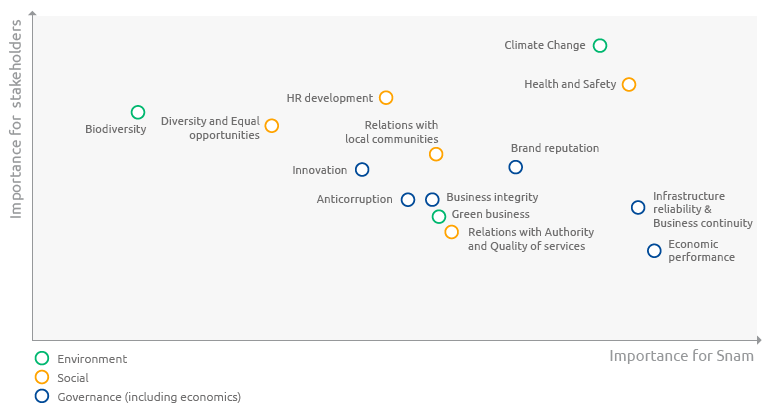Material issues according to the activities carried out
Materiality analysis
In order to identify the environmental and social matters, personnel-related issues, respect for human rights, and the fight against bribery and corruption, which are relevant taking into account the company's activities and characteristics, the Company conducted a materiality analysis to identify the most significant topics for the Group and Stakeholders in the spheres specified in Legislative Decree 254/2016 to the extent necessary to ensure the activities of the Snam Group, its performance, results and the impact it produces are understood.
Materiality is the principle of reference to better focus the reporting of activities on sustainability issues that best reflect the organization’s economic, environmental and social impacts or that influence stakeholders’ decisions.
At the end of 2018, Snam launched the update of topics that have historically fallen within the scope of its sustainability activities. More specifically, the analysis started out by identifying the matters reported in the main sustainability trends and media, considered as representative of the contexts of multi-stakeholder debate and discussion. These issues were subsequently given some context with respect to the Snam’s main businesses, benchmarking with the main peer companies at a national and international level, and through the most important market publications.
In order to define the externally most significant topics, their perception by stakeholders was analysed (including employees) through the above-described analyses and taking into account the latest on-line survey performed. The categories of stakeholders considered were: Community and territory, Investors and financiers, Other operators, Media, Suppliers, Customers, People (Employees), Authorities and Institutions.
Instead, to define the topics of greatest internal significance, the perception of the topics form the company’s viewpoint was analysed, through a specific survey involving the heads of each department.
The joint consideration of internal and external significance led to identifying areas of priority and materiality.
2018 materiality matrix

Results of the materiality analysis for the purposes of the Decree
The material topics within the scopes envisaged by Italian Legislative Decree no. 254/2016 as subsequently supplemented, are those relating to health and safety, climate change, protection of the territory and biodiversity, green business, economic performance and creation of value, reliability of infrastructures and business continuity, brand reputation, innovation, relations with the authorities and quality of service, relations with local communities, development and protection of the human capital, fight against corruption, business integrity, diversity and equal opportunities.
Scopes of the decree |
2018 Material topics |
Reference GRI standards |
Environment, health and safety |
Climate change, health and safety, protection of the territory and biodiversity, green business |
GRI 302 Energy |
Social aspects |
Economic performance, reliability of infrastructures and business continuity, brand reputation, innovation, relations with the authorities and quality of service, relations with local communities |
GRI 201 Economic Performance |
Aspects relating to staff management |
Developing and protecting human capital |
GRI 401 Employment |
Protecting Human Rights |
Diversity and equal opportunities |
GRI 406 Non discrimination |
Anticorruption and bribery |
Fight against corruption, business integrity |
GRI 205 Anti-corruption |